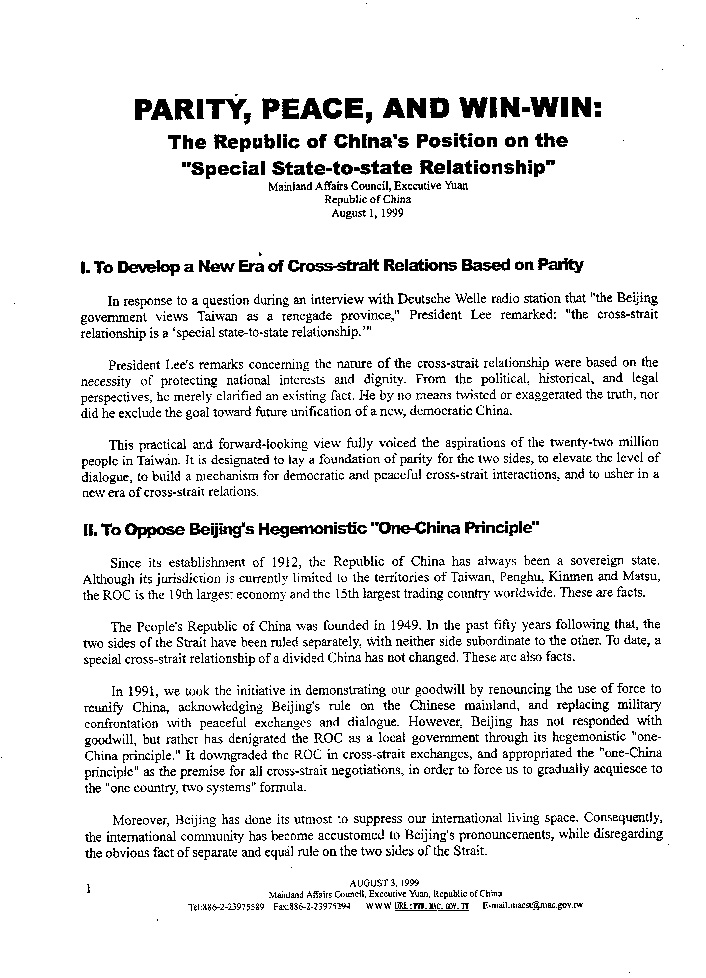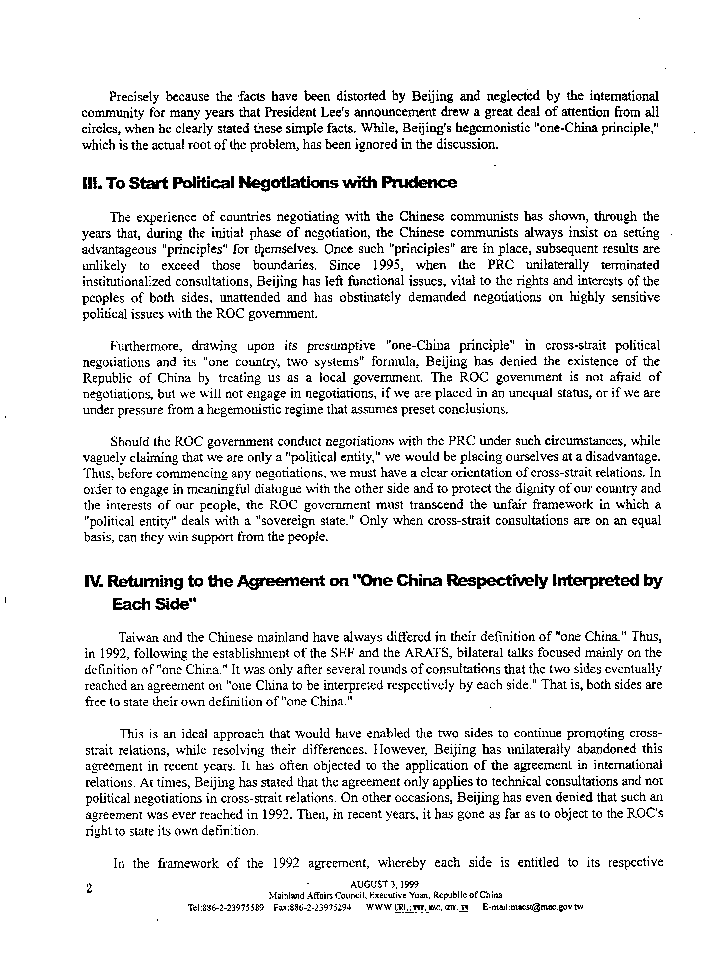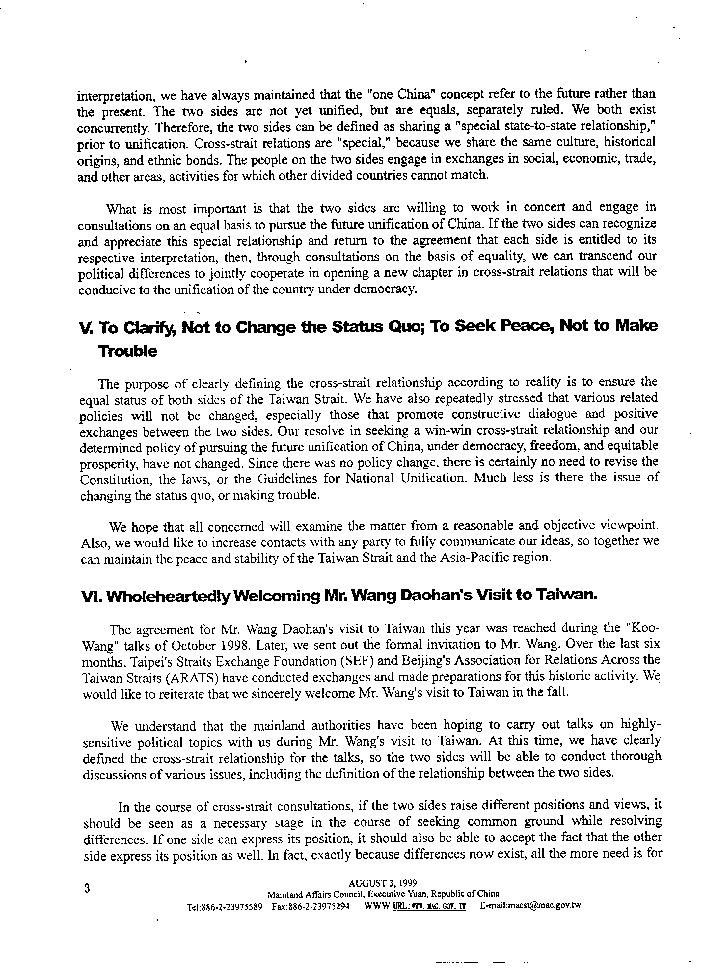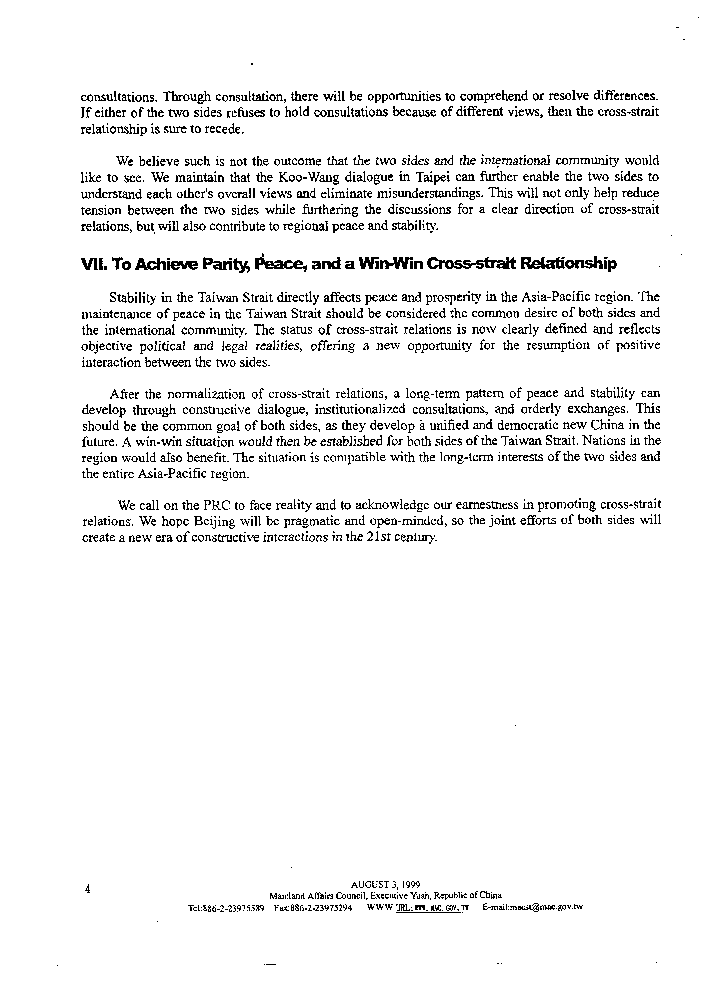| 新聞報導 - 大地新聞報導 | |
| 作者 台灣大地文教基金會 | |
| 2014-08-06 | |

內文翻譯:
致意台中,台灣,1999年8月3日 親愛的柯林頓總統先先生, 副總統高爾先生, 歐布萊特女士, 若拉巴切先生, 參議員賀姆斯先生, 參議員史密斯先生, 參議員吳振偉先生, 參議員比爾拉科先生, 參議員麥諾提先生, 參議員杜契先生, 參議員安德魯斯先生, 羅賓遜女士, 希拉蕊女士, 布萊爾總理先生, 達萊馬總理先生, 斯卡爾法羅總統先生, 秘書長蘇拉那先生, 秘書長史威莫先生, 秘書長塔席斯先生, 副秘書長庫格先生, 小淵惠三總理先生, 霍華德總理先生, 佛格森先生, 金大中先生, 哈比比總統先生, 華盛頓郵報總編輯先生, 新聞週刊總編輯先生, 時代雜誌總編輯先生, “我教他們掌握他們自己的命運”,孫明華,台北一位中學老師說。”下一個世代長大後將認為他們自己是新台灣人,跟中國沒啥關係了。” 新的歷史呈現蔣介石曾風光一時的軍隊在大陸面對共產軍隊的挫敗後是如何真正地對待台灣。1947年2月28日本地人起義,蔣介石開始把人送過來為他即將抵達台灣做準備,國民黨員在長達一個月的鎮壓期間屠殺了超過5萬名台灣人與原住民。惡名昭彰的”228事件”替接下來40年的壓迫鋪了路,就是大家所知道的”白色恐怖”。台灣人不被允許說原本的語言或甚至提到228,直到1998年蔣介石跟他兒子都死去。 1994年本土台灣人總統李登輝當選後開始調整課綱,在李主政下,台灣人在政治上把大陸人放在一邊,民主台灣的台灣人隨著政治上的自由開始有獨立的想法。 誰是”麻煩製造者”?這個問題現在需要被問的是:既然重啟辜汪會談全部的重點就是樣讓柯林頓當局開心,且當局展現出他自己是一個可恥的政黨,那麼為何要干擾辜汪會談? 中國很顯然沒有意願要達成任何台灣感興趣議題的協議,所以汪的訪問只是展示出中國另外一個讓人難以忍受的氣燄,會談後一定會被認為失敗,因為”台灣的不妥協”,這使美國國務院的中國綏靖主義再次重彈”台灣是麻煩製造者”的老調。20年後,台灣已重塑出華人的新希望,但共產中國持續實行民族主義並持續獨裁統治,台灣已變成新國家,但美國仍堅持快20年的”一中政策”。 7月18日,柯林頓打電話跟江澤民總理談了30分鐘,跟中國領導人重申只支持”一中政策”。李登輝在7月9日發表的與北京”特殊國與國關係”的意見似乎對他那個神聖的宗旨提出反駁。 柯林頓隨後在一場白宮記者會提到,他”沒有完全確定…李登輝的聲明想要傳達什麼意思”──表示他完全知道李登輝要說的事但是不想聽的一種禮貌性說法。很不幸地,台北的低語只是說出真相而不是對北京恐嚇的反彈。 我們對於本週26位美國參議員發表聯合信件給白宮表示歡迎,這封信裡,他們要求柯林頓總統不要因為李登輝的”特殊國與國關係政策聲明激怒北京”而對台灣施壓,”我們完全支持由民主選舉選出來的李總統與台灣人去追求更大的國際地位”,信中提到,在有需要幫助時出來的朋友就是真正的朋友,台灣迫切想要保持這種正義。 洛杉磯時報(1999年8月1日)評論── 根據最近的研究,台灣享有本世紀世界上最快的經濟成長率,自從1990年每年4.8%增加到台灣相對平均的財務分配,很難再有如此大的經濟成就故事。 在此同時,政治上,台灣現在很民主,幾乎所有重要官員都由人民直選,任何事都可在媒體公開討論,沒有議題是敏感的,沒有禁忌,由此來看,台灣可能是亞洲最自由的社會。 …綜觀上述,如果台灣不是一個值得奮戰的國家,那麼哪個國家才是? 台灣需要您們的支持。 楊緒東 台灣大地文教基金會董事長 *「楊緒東醫師給希拉蕊的信」全系列終
Aug 3,1999---Bill Clinton, Al Gore, Madelein Korbel Albright, Dana Rohrabacher, Jess Helms, Christopher H. Smith, David Wu, Michael Bilirakis, Michael R. McNulty, Peter Deutsch, Robert E. Andrews, Mary Robinson, Hillary Rodham Clinton, Tony Blair, Massimo D'Alema, Oscar Luigi Scalsaro, Javier Solana, Walter Schwimmer, Daniel TARSCHYS, Hans Christian Kruger, Keizo Obuchi, John Howard, Martin Ferguson, Kim Dae Jung, Habibie, Washington Post Editor, Newsweek Letters Editor, Time Letters Editor
Taiwan Tati Cultural And Educational Foundation B16F, No.3 Ta-Tun 2St. Taichung, Taiwan, ROC August 3, 1999. Dear Mr. President Bill Clinton, Mr. Vice President Al Gore, Mrs. Madeleine Korbel Albright, Mr. Representative Dana Rohrabacher, Mr. Senator Jesse Helms, Mr. Representative Christopher H. Smith, Mr. Representative David Wu, Mr. Representative Michael Bilirakis, Mr. Representative Michael R. McNulty, Mr. Representative Peter Deutsch, Mr. Representative Robert E. Andrews, Mrs. Mary Robinson, Mrs. Hillary Rodham Clinton, Mr. Prime Minister Tony Blair, Mr. Prime Minister Massimo D'Alema, Mr. President Oscar Luigi Scalsaro, Mr. Secretary-General Javier Solana, Mr. Secretary General Walter Schwimmer, Mr. Secretary General Daniel TARSCHYS, Mr. Deputy Secretary General Hans Christian Kruger, Mr. Prime Minister Keizo Obuchi, Mr. Prime Minister John Howard, Mr. Martin Ferguson, Mr. Kim Dae Jung, Mr. President Habibie, Mr. Washington Post Editor, Mr. Newsweek Letters Editor, Mr. Time Letters Editor, "I teach them to be masters of their own destiny," says Sun Ming-hua, who teaches the course in a Taipei middle school. "The next generation will grow up to think of themselves as new Taiwanese, less closely linked to China." The new history expresses how Chiang Kai-shek's once glorified troops really treated Taiwan, facing defeat by communist forces on the mainland. Chiang began sending men to prepare for his arrival on Taiwan, when locals rose up in revolt on February 28, 1947. The nationalists slaughtered more than 50,000 Taiwanese and aborigines during a monthlong crackdown. The infamous "2/28 incident" paved the way for four decades of oppression known as the " white terror." Taiwanese were not allowed to speak their native tongue or even to mention 2/28 until years after the passing of both Chiang and his son, in 1988. The curriculum began to change with the 1994 election of Lee, native Taiwanese President. Under Lee, native Taiwanese have sidelined the mainlanders politically. Democratic Taiwan with new Taiwanese is coming after independent thinking, in tune with Taiwan's new political freedoms. Who is "trouble-maker"? The question that needs to be asked now is this: since the whole point of resurrecting the Koo-Wang talks was to keep the Clinton administration happy, and since that administration has shown itself to be shamefully partisan, then why bother with Koo-Wang talks at all? China is clearly in no mood to want to reach an agreement about anything Taiwan might be interested in. So Wang's visit will only serve as another display of insufferable Chinese arrogance, after which the meeting will be deemed a failure because of "Taiwanese intransigence", allowing the U.S. State Department's China-appeasers to redouble their "Taiwan is a trouble-maker" rhetoric. After 20 years, Taiwan is reforming to new Chinese hope, but communist China keeps nationalism and holds dictatorship still. Taiwan is changing into real new state, but U.S. insists "one China policy" for about 20 years. On July 18, Clinton placed a 30-minuste pone call to President Jiang Zemin, assuring the Chinese leader the U.S. still supported a "one China" police. Lee had seemed to contradict his sacrosanct doctrine with his July 9 comments claiming a "special state-to-state relationship" with Beijing. Clinton subsequently said at a White House press conference that he was " not entirely sure ... What the Lee statements were trying to convey" --- a polite way saying he knew exactly what Lee was trying to say but didn't want to hear it. Unfortunately, Taipei's whispers just to tell the truth instead a rebound of Beijing's thunder. We are all welcome 26 U.S. senators sent a joint letter to the White House this week. In the letter, they asked President Clinton not to pressure Taiwan because of Lee's "state-to-state relationship policy statement that has infuriated Beijing. "We fully support democratically-elected President Lee and the people of Taiwan in their search for greater international status," the letter said. A friend in need is a friend indeed. Taiwan wants to keep this kind of justice urgently. From commentary of the Los Angeles Times (August 1, 1999) --- According to a recent study, Taiwan has enjoyed the fastest rate of economic growth in the world this century; 4.8 percent a year since 1900 add to this Taiwan's relatively equal distribution of wealth, and its hard to think of a greater economic success story. Meanwhile, politically, Taiwan is now democratic with all important officials directly elected by the people. Anything and everything can be, and is, publicly discussed in the media. No topic is too sensitive, nothing is taboo. In this respect, Taiwan may now be the freest society in Asia. ... Given all the above, if a country like Taiwan isn't worth fighting for, what country would be? Taiwan needs your support. Sincerely Yours, Yang Hsu-Tung. President Taiwan Tati Cultural And Educational Foundation
附錄二:中華民國對特殊國與國關係的立場(中英文)(source: 大陸資訊及研究中心)
中華民國對特殊國與國關係的立場(88.8.1) 對等、和平 與雙贏 ─ 中華民國對「特殊國與國關係」的立場 中華民國八十八年八月一日 行 政 院 大 陸 委 員 會 一、以對等地位開創跨世紀的兩岸關係 李總統本年七月九日在接受「德國之聲」專訪時,就「北京視台灣為叛離的一省」提問時表示,兩岸關係的定位是「特殊的國與國關係」。 李總統對兩岸定位的這項陳述是基於維護國家利益與尊嚴的前提,從政治、歷史與法律的觀點,對既存事實作明確的說明,既未扭曲事實,也未誇大渲染,更沒有排除未來兩岸統一為民主新中國的目標。這項務實、前瞻並且充分反映中華民國在台灣二千二百萬人民心聲的主張,是為了奠定兩岸對等的基礎,以提昇對話的層次,進而建立民主和平的兩岸交往機制,開創跨世紀的兩岸關係。 二、反對中共霸權式的「一個中國原則」 中華民國自一九一二年立國以來,一直是一個主權獨立的國家,目前統治地區雖只限於台、澎、金、馬,但仍是全世界第十九大經濟體及第十五大貿易國,這是事實。一九四九年中華人民共和國成立後,五十年來,兩岸隔海分治、互不隸屬,一個分治的中國及兩岸間的特殊關係至今未變,這也是事實。一九九一年我們主動展現善意,放棄以武力統一中國,承認中共在大陸之治權,並以交流、對話的和平方式取代過去的軍事對峙。但是中共不但沒有善意回應,反以其霸權的「一個中國原則」,視我為其地方政府,不僅在兩岸交流中矮化我方,並將「一個中國原則」作為兩岸所有協商議題的前提,欲迫我逐步滑向「一國兩制」的安排。同時中共還極力封殺我國際生存空間,使國際社會長久以來習於中共的說法,而逐漸忽視兩岸分治對等之既存事實。正因這一事實長期遭受中共片面的扭曲及國際社會的忽視,所以當李總統明確陳述此一簡單事實時,反引起各界之高度關注,而忽略了問題真正之根源為中共的霸權式的「一個中國原則」。 三、政治談判慎於始 各國多年來與中共談判的經驗顯示,中共在談判初始一定堅持設定對己有利的「原則」。此一「原則」一旦設定,結論就大致不出其掌握。自一九九五年中共片面中斷兩岸的制度化協商以後,北京即置攸關兩岸人民權益至鉅的實質問題於不顧,一味要求與我進行政治談判,並對兩岸政治談判預設「一個中國原則」的前提及「一國兩制」的結論,視我為地方政府,否定中華民國之存在。我們並不畏懼談判,但絕不在不平等,及對方已預設結論之霸權壓力下談判。倘我在此情勢下與中共進行政治談判,而仍自居為模糊的「政治實體」,就會自始陷於不利地位。所以,我們有必要在談判前對兩岸關係明確定位,跳出「政治實體」對「主權國家」的格局,才能與對方展開有意義的對話,並維護國家及人民之尊嚴與利益。也只有基於平等地位的協商,才能獲得人民的支持。 四、兩岸應該回到「一個中國,各自表述」的共識 兩岸對「一個中國」的認知一直有歧異。所以海基會與海協會於成立後的第一年會談就圍繞在「一個中國」的爭議。經過多回合談判,兩岸終在一九九二年十一月達成「一個中國,各自表述」的共識,亦即雙方自此就「一個中國」可以各說各話。這原本是使雙方能擱置歧見,繼續推動兩岸關係之理想方式。然而近年大陸方面卻片面拋棄該共識,時而反對該項共識適用於國際關係,時而表示在兩岸間僅適用於事務性商談,不適用於政治談判,時而甚至否認於一九九二年曾達成該項共識,近年甚至反對我方亦有表述權利。在一九九二年各自表述的共識架構下,我方始終認為「一個中國」指的不是現在,而是未來。兩岸目前並未統一,而是對等分治,同時存在,因此在統一前可以特殊的國與國關係加以定位。而兩岸關係之所以特殊,是因為具有相同之文化、歷史淵源及民族情感,雙方人民在社會、經貿等各層面交流密切,非其它分裂國家所能比擬。最重要的是雙方均有意願共同努力,平等協商,追求中國未來之統一。如果雙方都能珍視此種特殊關係,回到各自表述的共識,那麼透過平等協商,即可超越彼此的政治歧見,共同合作為兩岸關係開創新局面,進而更有利於未來之民主統一。 五、陳述現狀,不是改變現狀;追求和平,不是製造麻煩 我們將兩岸關係依事實予以明確定位,目的在確立兩岸間的平等地位。我們也一再強調,各項相關政策不變,尤其是推動兩岸建設性對話、與良性交流的政策,追求兩岸「雙贏」的決心,及追求中國未來在民主、自由、均富下統一的既定政策沒有任何改變。政策未變,自不存在所謂修憲、修法、修改國統綱領的問題,更談不上是改變現狀或製造麻煩。我們希望相關各方能以理性客觀立場看待此事,我們也願與任何相關各方加強溝通,傳達我方整體理念,共同維護台海及亞太地區之和平與安定。 六、竭誠歡迎汪道涵先生來訪 汪道涵先生年內來台訪問,是去年十月「辜汪會晤」時的共識,我方也正式提出邀請。近半年來,海基、海協兩會對此一具重大意義的活動,已進行正式的磋商與準備。我們重申誠摯歡迎汪先生今年秋天來訪。我們了解中共方面一直希望藉汪道涵先生訪台之行,與我就重要政治議題進行對話。此時我為迎接會談而對兩岸關係明確定位後,雙方可以對包括定位在內之各項問題進行深入討論。兩岸協商的過程中,雙方提出不同的立場與看法,乃是求同存異過程中的必要階段。既然一方可以表達其立場,當然也要接納他方表達立場。事實上正因歧見存在,才更需要協商。透過協商,歧見將可獲得溝通甚或解決之機會,倘因有不同意見而拒絕協商,必定造成兩岸關係的倒退,相信這並非雙方人民及國際社會所樂見。我們認為透過辜汪台北對話,可使雙方進一步了解彼此的全盤理念,消弭誤解。這對降低兩岸緊張情勢,進一步探討開創兩岸關係的明確方向,必有助益,也可為區域和平與穩定作出貢獻。 七、對等和平共造「雙贏」 台海的穩定直接影響亞太地區之和平與繁榮,故維持台海和平應該是兩岸與國際社會的共同願望。我們現在依客觀存在的政治與法律事實明確定位兩岸關係,將可使兩岸重新開啟良性互動的新頁。兩岸關係正常化後,雙方更可透過建設性對話、制度化協商,以及有秩序的交流,逐步發展出和平穩定的長期關係架構,共同追求未來民主統一的新中國。這不僅是兩岸的雙贏,台海及鄰近區域亦將同蒙其利,符合兩岸及整個亞太地區的長遠利益。我們呼籲中共能面對現實,理解我方推展兩岸關係的苦心,以務實開放的心態,與我們共同努力,為廿一世紀兩岸良性互動開創新局。 PARITY, PEACE, AND WIN-WIN: Republic of China's Position on the "Special State-to-state Relationship" Mainland Affairs Council, Executive Yuan Republic of China August 1, 1999 I. To Develop a New Era of Cross-strait Relations Based on Parity In response to a question during an interview with Deutsche Welle radio station that "the Beijing government views Taiwan as a renegade province," President Lee remarked: "the cross-strait relationship is a 'special state-to-state relationship.'" President Lee's remarks concerning the nature of the cross-strait relationship were based on the necessity of protecting national interests and dignity. From the political, historical, and legal perspectives, he merely clarified an existing fact. He by no means twisted or exaggerated the truth, nor did he exclude the goal toward future unification of a new, democratic China. This practical and forward-looking view fully voiced the aspirations of the twenty-two million people in Taiwan. It is designated to lay a foundation of parity for the two sides, to elevate the level of dialogue, to build a mechanism for democratic and peaceful cross-strait interactions, and to usher in a new era of cross-strait relations. II. To Oppose Beijing's Hegemonistic "One-China Principle" Since its establishment of 1912, the Republic of China has always been a sovereign state. Although its jurisdiction is currently limited to the territories of Taiwan, Penghu, Kinmen and Matsu, the ROC is the 19th largest economy and the 15th largest trading country worldwide. These are facts. The People's Republic of China was founded in 1949. In the past fifty years following that, the two sides of the Strait have been ruled separately, with neither side subordinate to the other. To date, a special cross-strait relationship of a divided China has not changed. These are also facts. In 1991, we took the initiative in demonstrating our goodwill by renouncing the use of force to reunify China, acknowledging Beijing's rule on the Chinese mainland, and replacing military confrontation with peaceful exchanges and dialogue. However, Beijing has not responded with goodwill, but rather has denigrated the ROC as a local government through its hegemonistic "one-China principle." It downgraded the ROC in cross-strait exchanges, and appropriated the "one-China principle" as the premise for all cross-strait negotiations, in order to force us to gradually acquiesce to the "one country, two systems" formula. Moreover, Beijing has done its utmost to suppress our international living space. Consequently, the international community has become accustomed to Beijing's pronouncements, while disregarding the obvious fact of separate and equal rule on the two sides of the Strait. Precisely because the facts have been distorted by Beijing and neglected by the international community for many years that President Lee's announcement drew a great deal of attention from all circles, when he clearly stated these simple facts. While, Beijing's hegemonistic "one-China principle," which is the actual root of the problem, has been ignored in the discussion. III. To Start Political Negotiations with Prudence The experience of countries negotiating with the Chinese communists has shown, through the years that, during the initial phase of negotiation, the Chinese communists always insist on setting advantageous "principles" for themselves. Once such "principles" are in place, subsequent results are unlikely to exceed those boundaries. Since 1995, when the PRC unilaterally terminated institutionalized consultations, Beijing has left functional issues, vital to the rights and interests of the peoples of both sides, unattended and has obstinately demanded negotiations on highly sensitive political issues with the ROC government. Furthermore, drawing upon its presumptive "one-China principle" in cross-strait political negotiations and its "one country, two systems" formula, Beijing has denied the existence of the Republic of China by treating us as a local government. The ROC government is not afraid of negotiations, but we will not engage in negotiations, if we are placed in an unequal status, or if we are under pressure from a hegemonistic regime that assumes preset conclusions. Should the ROC government conduct negotiations with the PRC under such circumstances, while vaguely claiming that we are only a "political entity," we would be placing ourselves at a disadvantage. Thus, before commencing any negotiations, we must have a clear orientation of cross-strait relations. In order to engage in meaningful dialogue with the other side and to protect the dignity of our country and the interests of our people, the ROC government must transcend the unfair framework in which a "political entity" deals with a "sovereign state." Only when cross-strait consultations are on an equal basis, can they win support from the people. IV. Returning to the Agreement on "One China Respectively Interpreted by Each Side" Taiwan and the Chinese mainland have always differed in their definition of "one China." Thus, in 1992, following the establishment of the SEF and the ARATS, bilateral talks focused mainly on the definition of "one China." It was only after several rounds of consultations that the two sides eventually reached an agreement on "one China to be interpreted respectively by each side." That is, both sides are free to state their own definition of "one China." This is an ideal approach that would have enabled the two sides to continue promoting cross-strait relations, while resolving their differences. However, Beijing has unilaterally abandoned this agreement in recent years. It has often objected to the application of the agreement in international relations. At times, Beijing has stated that the agreement only applies to technical consultations and not political negotiations in cross-strait relations. On other occasions, Beijing has even denied that such an agreement was ever reached in 1992. Then, in recent years, it has gone as far as to object to the ROC's right to state its own definition. In the framework of the 1992 agreement, whereby each side is entitled to its respective interpretation, we have always maintained that the "one China" concept refer to the future rather than the present. The two sides are not yet unified, but are equals, separately ruled. We both exist concurrently. Therefore, the two sides can be defined as sharing a "special state-to-state relationship," prior to unification. Cross-strait relations are "special," because we share the same culture, historical origins, and ethnic bonds. The people on the two sides engage in exchanges in social, economic, trade, and other areas, activities for which other divided countries cannot match. What is most important is that the two sides are willing to work in concert and engage in consultations on an equal basis to pursue the future unification of China. If the two sides can recognize and appreciate this special relationship and return to the agreement that each side is entitled to its respective interpretation, then, through consultations on the basis of equality, we can transcend our political differences to jointly cooperate in opening a new chapter in cross-strait relations that will be conducive to the unification of the country under democracy. V. To Clarify, Not to Change the Status Quo; To Seek Peace, Not to Make Trouble The purpose of clearly defining the cross-strait relationship according to reality is to ensure the equal status of both sides of the Taiwan Strait. We have also repeatedly stressed that various related policies will not be changed, especially those that promote constructive dialogue and positive exchanges between the two sides. Our resolve in seeking a win-win cross-strait relationship and our determined policy of pursuing the future unification of China, under democracy, freedom, and equitable prosperity, have not changed. Since there was no policy change, there is certainly no need to revise the Constitution, the laws, or the Guidelines for National Unification. Much less is there the issue of changing the status quo, or making trouble. We hope that all concerned will examine the matter from a reasonable and objective viewpoint. Also, we would like to increase contacts with any party to fully communicate our ideas, so together we can maintain the peace and stability of the Taiwan Strait and the Asia-Pacific region. VI. Wholeheartedly Welcoming Mr. Wang Daohan's Visit to Taiwan. The agreement for Mr. Wang Daohan's visit to Taiwan this year was reached during the "Koo-Wang" talks of October 1998. Later, we sent out the formal invitation to Mr. Wang. Over the last six months, Taipei's Straits Exchange Foundation (SEF) and Beijing's Association for Relations Across the Taiwan Straits (ARATS) have conducted exchanges and made preparations for this historic activity. We would like to reiterate that we sincerely welcome Mr. Wang's visit to Taiwan in the fall. We understand that the mainland authorities have been hoping to carry out talks on highly-sensitive political topics with us during Mr. Wang's visit to Taiwan. At this time, we have clearly defined the cross-strait relationship for the talks, so the two sides will be able to conduct thorough discussions of various issues, including the definition of the relationship between the two sides. In the course of cross-strait consultations, if the two sides raise different positions and views, it should be seen as a necessary stage in the course of seeking common ground while resolving differences. If one side can express its position, it should also be able to accept the fact that the other side express its position as well. In fact, exactly because differences now exist, all the more need is for consultations. Through consultation, there will be opportunities to comprehend or resolve differences. If either of the two sides refuses to hold consultations because of different views, then the cross-strait relationship is sure to recede. We believe such is not the outcome that the two sides and the international community would like to see. We maintain that the Koo-Wang dialogue in Taipei can further enable the two sides to understand each other's overall views and eliminate misunderstandings. This will not only help reduce tension between the two sides while furthering the discussions for a clear direction of cross-strait relations, but will also contribute to regional peace and stability. VII. To Achieve Parity, Peace, and a Win-Win Cross-strait Relationship Stability in the Taiwan Strait directly affects peace and prosperity in the Asia-Pacific region. The maintenance of peace in the Taiwan Strait should be considered the common desire of both sides and the international community. The status of cross-strait relations is now clearly defined and reflects objective political and legal realities, offering a new opportunity for the resumption of positive interaction between the two sides. After the normalization of cross-strait relations, a long-term pattern of peace and stability can develop through constructive dialogue, institutionalized consultations, and orderly exchanges. This should be the common goal of both sides, as they develop a unified and democratic new China in the future. A win-win situation would then be established for both sides of the Taiwan Strait. Nations in the region would also benefit. The situation is compatible with the long-term interests of the two sides and the entire Asia-Pacific region. We call on the PRC to face reality and to acknowledge our earnestness in promoting cross-strait relations. We hope Beijing will be pragmatic and open-minded, so the joint efforts of both sides will create a new era of constructive interactions in the 21st century.     相關閱讀: 楊緒東醫師給希拉蕊的信(27) 楊緒東醫師給希拉蕊的信(26) 楊緒東醫師給希拉蕊的信(25) 楊緒東醫師給希拉蕊的信(24) 楊緒東醫師給希拉蕊的信(23) 楊緒東醫師給希拉蕊的信(22) 楊緒東醫師給希拉蕊的信(21) 楊緒東醫師給希拉蕊的信(20) 楊緒東醫師給希拉蕊的信(19) 楊緒東醫師給希拉蕊的信(18) 楊緒東醫師給希拉蕊的信(17) 楊緒東醫師給希拉蕊的信(16) 楊緒東醫師給希拉蕊的信(15) 楊緒東醫師給希拉蕊的信(14) 楊緒東醫師給希拉蕊的信(13) 楊緒東醫師給希拉蕊的信(12) 楊緒東醫師給希拉蕊的信(11) 楊緒東醫師給希拉蕊的信(10) 楊緒東醫師給希拉蕊的信(9) 楊緒東醫師給希拉蕊的信(8) 楊緒東醫師給希拉蕊的信(7) 楊緒東醫師給希拉蕊的信(6) 楊緒東醫師給希拉蕊的信(5) 楊緒東醫師給希拉蕊的信(4) 楊緒東醫師給希拉蕊的信(3) 楊緒東醫師給希拉蕊的信(2) 楊緒東醫師給希拉蕊的信(1) 希拉蕊給楊緒東醫師的回信 延伸閱讀: 商業周刊-獨家專訪呼聲最高的下一位美國總統 希拉蕊:越依賴中國,台灣越脆弱 希拉蕊:太依賴中國 台灣會變脆弱 〈社論〉希拉蕊為台灣敲響警鐘 希拉蕊直白 戳破馬謊言 畫中有話-中共會2016年之前,逼阿九訂立急統不可逆的條約 畫中有話-中國人民還活在〝黑暗監牢〞,這是台灣人民要的生活嗎? 畫中有話-依天命此次的美國總統應該是〝希拉蕊〞,僅供參考
引用:台灣大地文教基金會
http://www.taiwantt.org.tw/tw/index.php?option=com_content&task=view&id=12131&Itemid=57 | |
2014年8月6日 星期三
楊緒東醫師給希拉蕊的信(28) ---下一個世代長大後將認為他們自己是新台灣人,跟中國沒啥關係了
訂閱:
張貼留言 (Atom)
沒有留言:
張貼留言